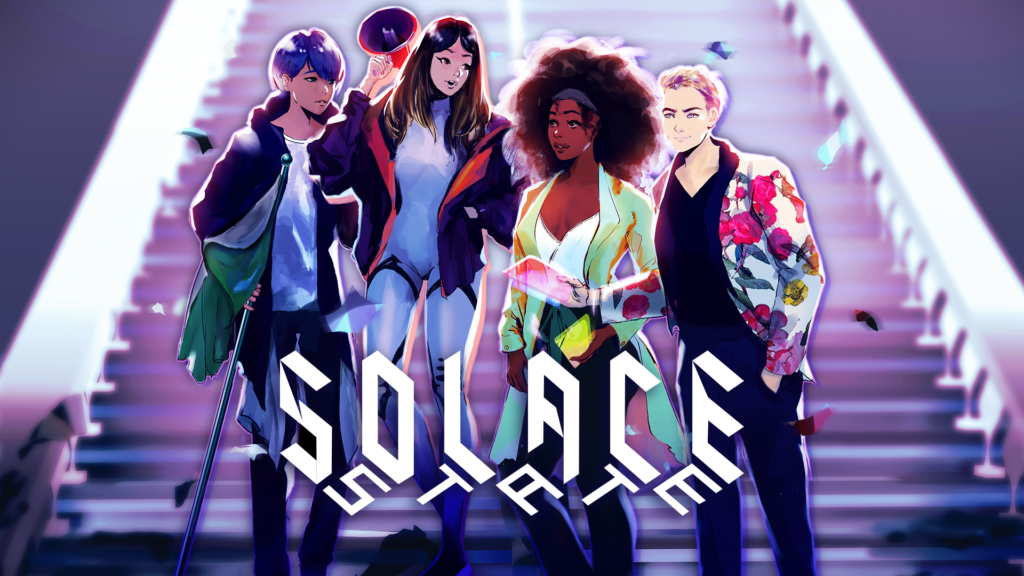
Image Source: Vivid Foundry
Solace State and the Return of Bio-awareness in Cyberpunk
“The Sky above the port was the color of television, tuned to a dead channel.”
In spite of how iconic this opening line of William Gibson’s Neuromancer, the novel that alongside movie classic Blade Runner launched the highly influential genre of cyberpunk, is, it’s rife with technological nostalgia and anachronism. Even during its initial 1984 publication, Gibson explains in the foreword for the 20th anniversary edition, the image of “black-and-white video-static” was taken from his childhood memories of the “sodium-silvery and almost painful” experience “of a signal-free channel on a wooden-cabinet Motorola with fabric-covered speakers.”
The paradoxical style and reference to retro technology and aesthetics has never truly left the cyberpunk genre. Gibson posits that the success of Neuromancer is due in large part to leaning into his ignorance of what hard science predictions could supposedly offer his unique brand of sci-fi. He points out that the most jarring moments of futuristic representation in the novel are when he relied on his then-current knowledge of technological advancements.
Cyberpunk as a genre has often both excelled and struggled with its signposting, on multiple levels. On the one hand, Gibson and the many creators influenced by him are certainly correct that the strengths of cyberpunk are that it reveals how global society is always a messy juxtaposition of past, present and future, but on the other it emphasizes an unlikely stasis of affairs. Of tech, social mores in high and low culture and politics of all kinds. There’s also often a de-emphasis or a steady, inevitable dissolution of the human body as technology becomes ever more prevalent and dystopic corporations constantly encroach on bodily autonomy.
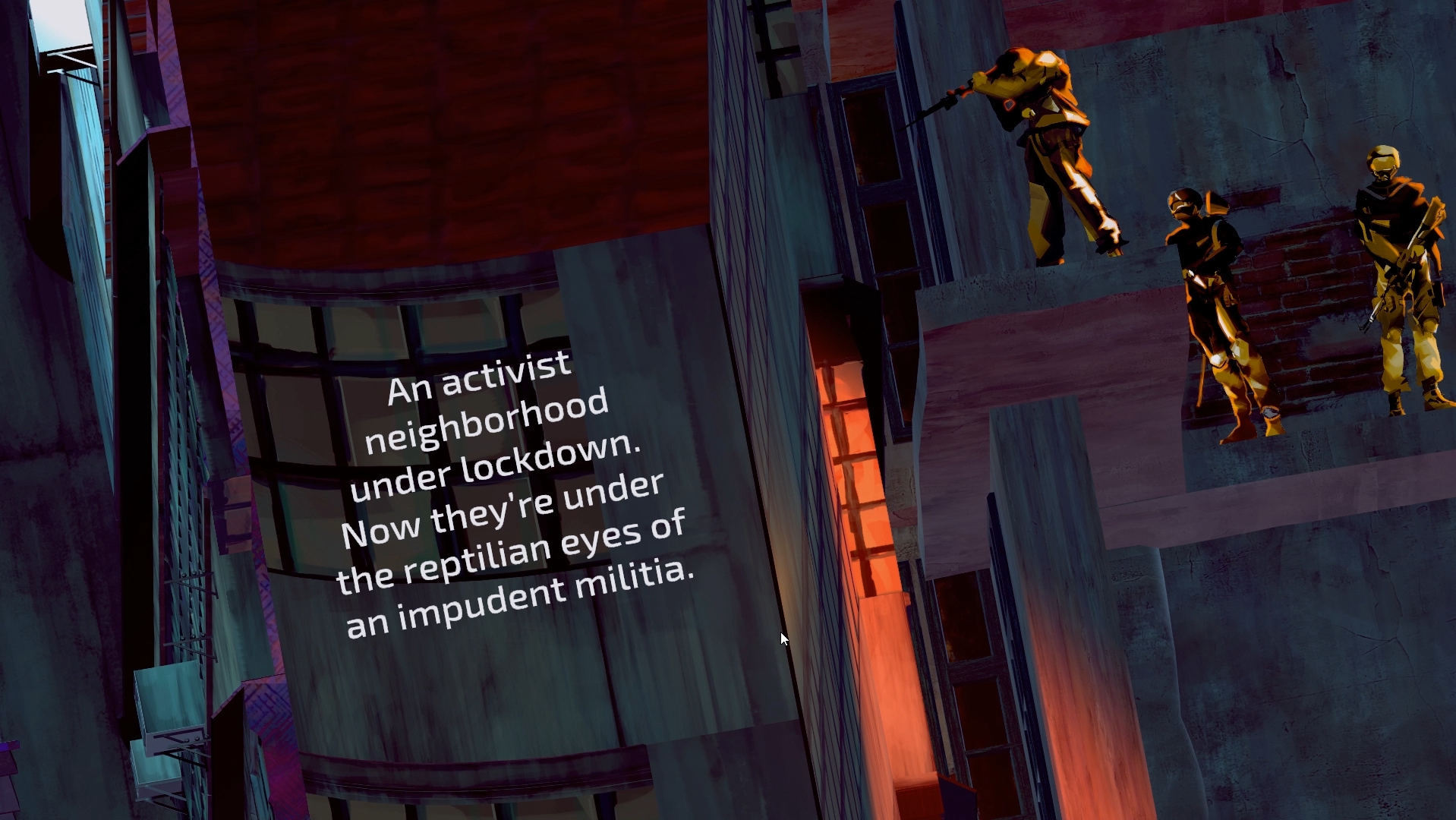
Solace State, the debut title developed by Vivid Foundry Corp., openly brands itself as telling the player “Emotional Cyberpunk Stories”. I find this intriguing because cyberpunk often has, in my experience of the genre growing up, a hyperfocus on cities as uncaring characters in of themselves. These cities’ populations often have suppressed or repressed emotions. Such pressure often results in spontaneous combustions of violent or passionate emotions as well. But emotions are pervasive, mutable and imbued in all our actions, even in what is one of our most empirical ages. And we all know by now (or at least I hope we do) the impossibility of complete objectivity in science and politics.
Of course there are exceptions; some people have disorders or other conditions which make processing or identifying emotions difficult. And those individuals are not any less human than those who do experience emotions. But the fact remains that Solace State, a game where you play as a young Iconohacker who can interface with and influence people’s emotions via innate quantum hacking abilities, starts from an important and often overlooked perspective in the cyberpunk genre.
Tanya Kan, the executive producer and creative director of Solace State, has a very Biopunk slant on the cyberpunk milieu in my opinion. For those who may not be aware, Biopunk and the Ribofunk manifesto associated with it, is a counter-genre and philosophy that critiques the outdated nature of cyberpunk’s focus on cybernetics. Writer of the manifesto and the eventual Ribofunk short story collection, Paul Di Filippo, stated that the “cyber” prefix had become an empty signifier since all it pointed towards was the same depictions of hacking and cyborgs that have populated the genre since its creation. As for the “punk” suffix, Di Filippo believes that the music genre and its “nihilistic, chiliastic worldview had already culminated in its only possible end: self-extinction.” This last point I’m not sure I entirely agree with, as punk is much more than just its early formations and has evolved over time to better suit what people consider a punk attitude and outlook in a late-capitalist society. But at the time of the writing of this manifesto, 1993, Di Filippo was extrapolating based on his zeitgeist of pre-Y2K and nearly a decade after cyberpunk’s proliferation.
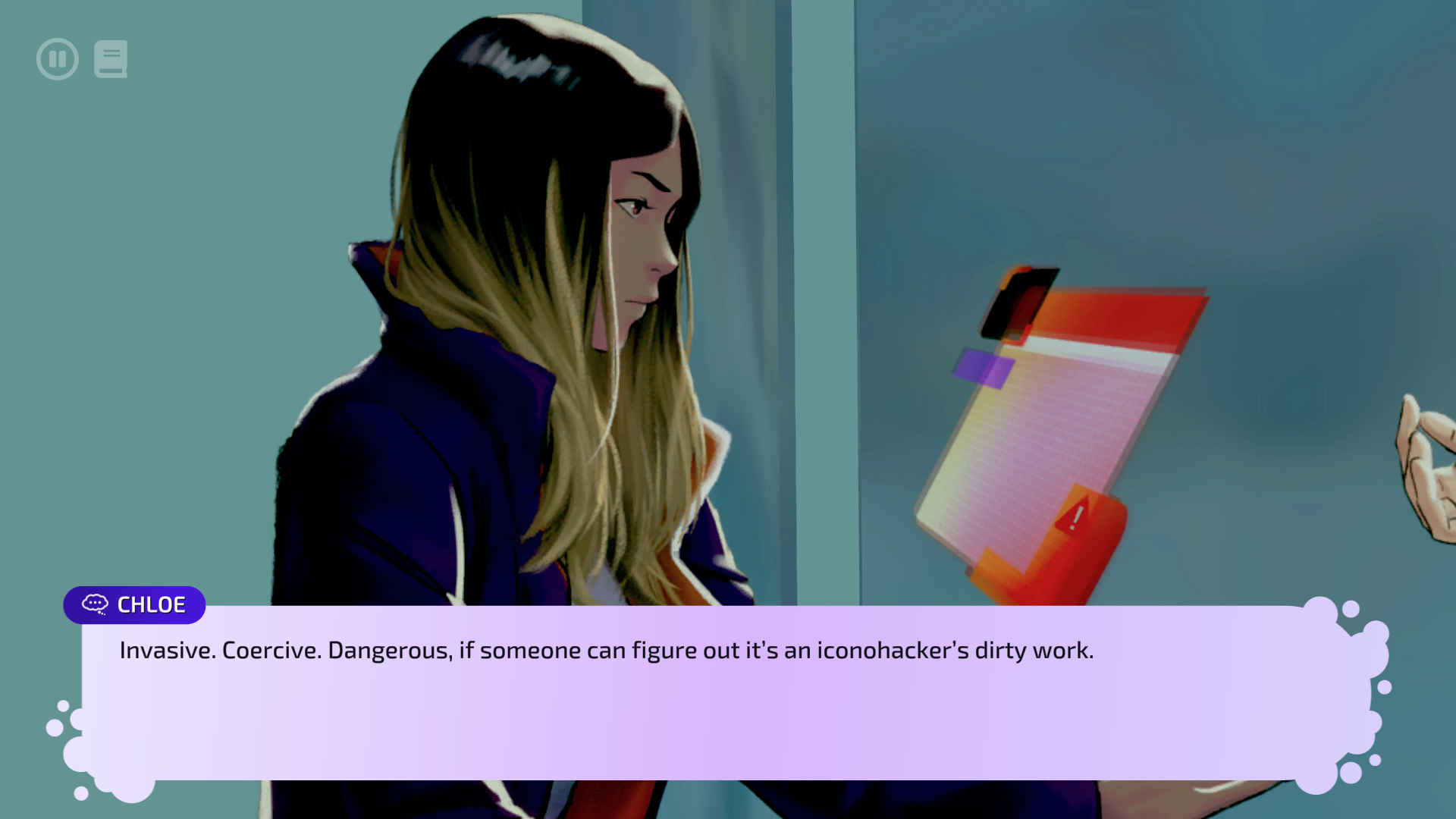
When I asked Kan to comment on the Biopunk aspects of her debut game, she told me that (in a direct reversal of Gibson’s approach) she drew a lot from current non-fiction to ground the politics of the game and its embodied reality.
“I want to play with the idea that what constitutes human biology and social norms are challenged by rapid technological advancements, and those norms themselves challenge the idea of citizenship,” Kan said. “How does a legal system look at someone like Chloe when she can change how people perceive her ID and briefly change someone’s feelings?”
The near future that Kan envisions is one that we don’t have to strain much to suspend our disbelief for. Detailed bio-metrics, bioelectricity and quantum neuroscience are all either actively researched or are heavily speculated on today. A lot of the innovative Iconohacker sequences were the result of many conversations with Kan’s science consultant, Dr. Ken Grisé.
Before I get ahead of myself, however, I should say what brought to mind Biopunk and the Ribofunk manifesto with regard to Solace State is its focus on how emotions are not just our experience of them, but the visceral, chemical reality of them as well. The human body and its cells are things we manipulate and are manipulated by. Politics are not just something we experience temporally, they are situated both within our bodies and enacted upon our bodies as well.
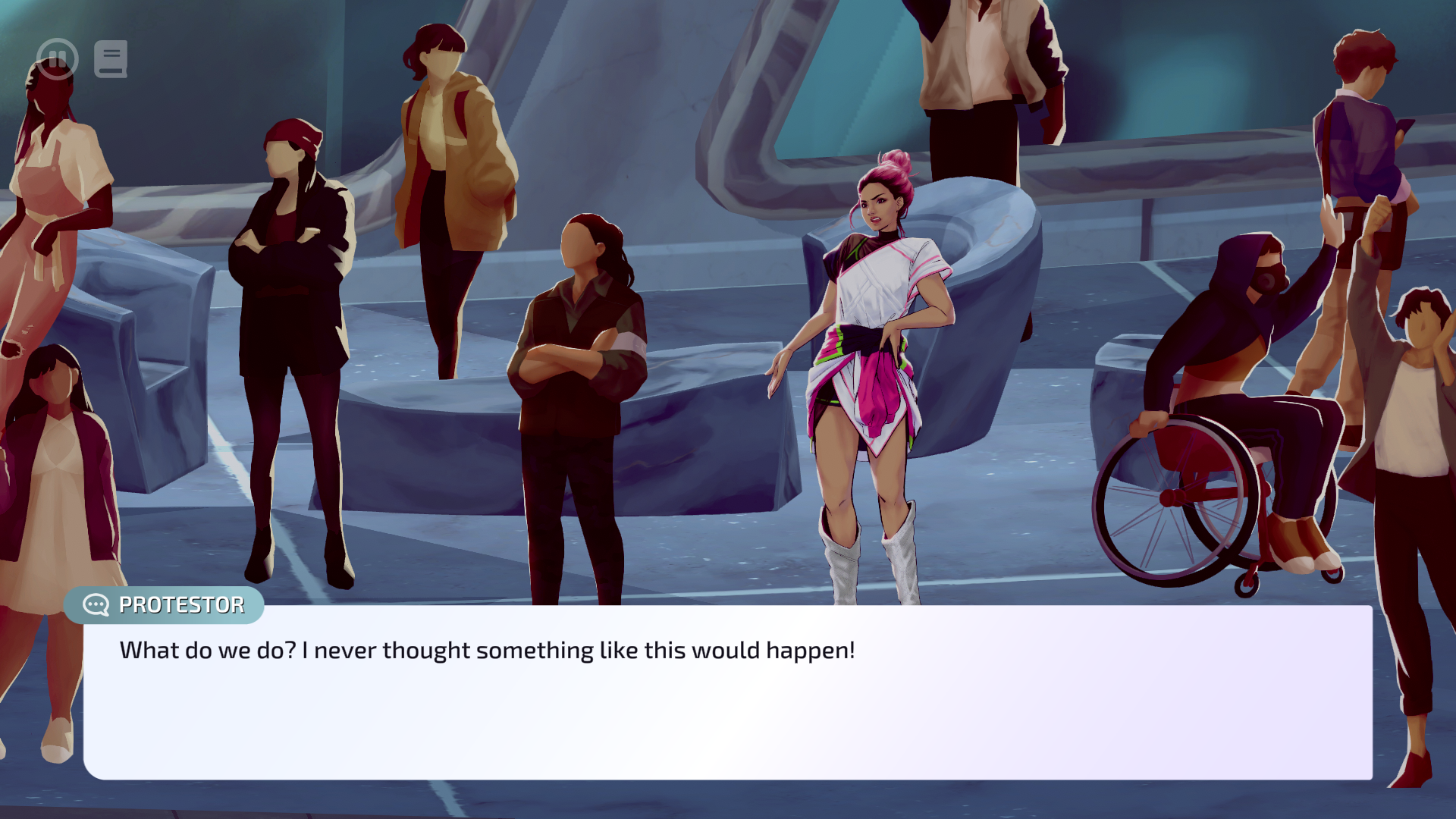
Don’t believe this? Think of how our ongoing pandemic, increasingly oppressive legislation against marginalized bodies such as anti-trans and anti-abortion acts and genocidal conflicts involving Palestine, Congo, Sudan and Ukraine (just to name a few) have affected bodies. And how technology, particularly social media, is merely an interface for becoming informed and hopefully mobilizing activists.
One of the most thorny struggles these days is reconciling the onslaught of emotions one may feel when faced with the sheer number of crises that have been occurring over time and cannot be simply quantified and distilled into neat fact sheets. Apathy and distance are often key in allowing these events to continue. And then of course there’s the need for self-care, which is its own warfare affirmed by figures such as Audre Lorde, Adrienne Maree Brown, Devon Price and Tricia Hersey. In order to enact politics, we must preserve and protect our bodies. We are the body politic, not just in a figurative sense, but a visceral one.
In the first act of Solace State, the protagonist Chloe is described as “a human with the innate ability to influence the physical and metaphysical world without biotech interfaces or cybernetics…She’s a theoretical possibility, a rare interface between human and digital circuitry, a myth of the biotech revolution.”
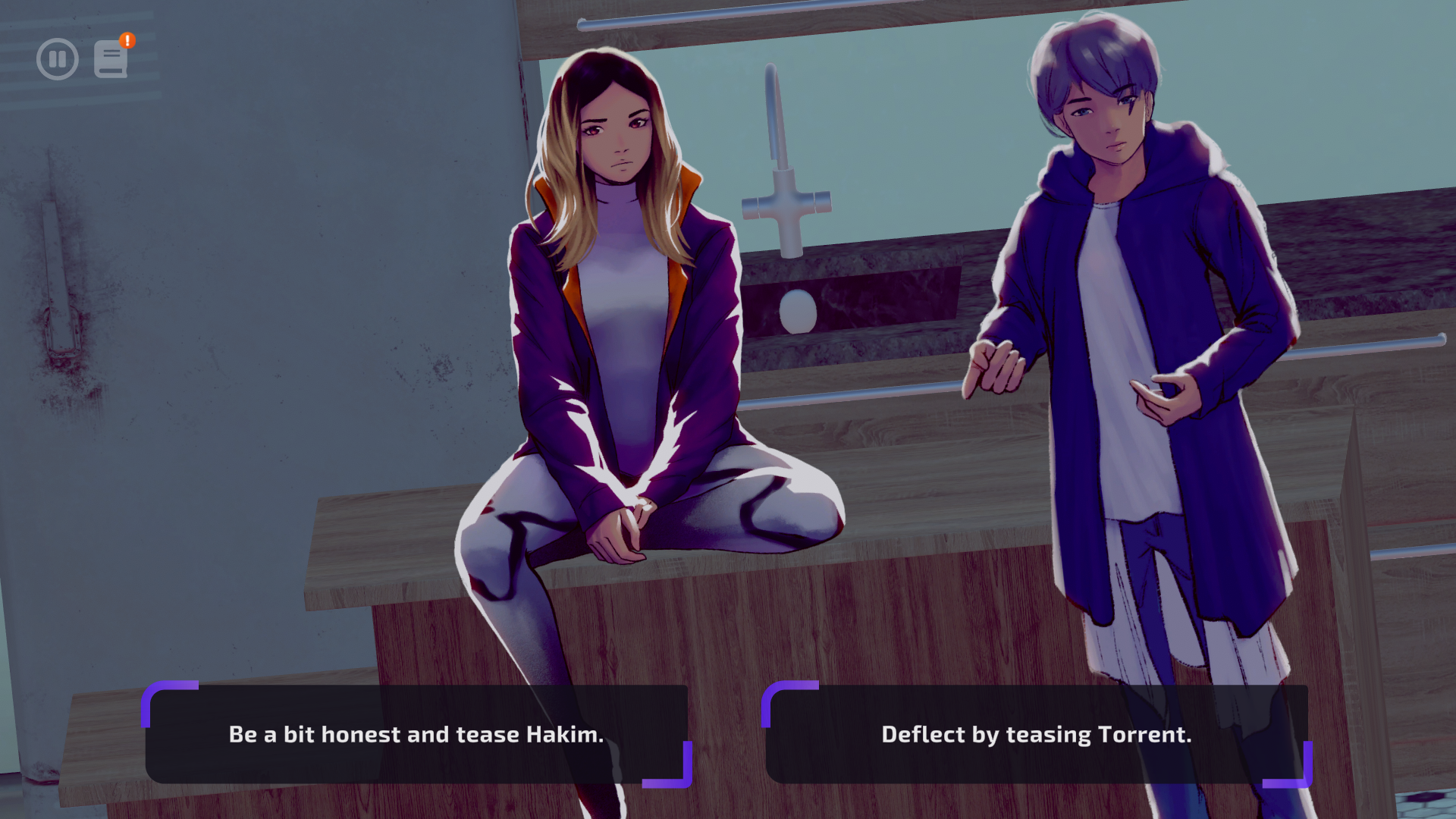
There are key points in Solace State where the player is given the choice to use Chloe’s quantum hacking abilities to hopefully swing the situation in her favor. She’s dealing with a corporate conspiracy which threatens bodily autonomy, so the stakes are high, but equally as high is her risk of falling prey to her own intergenerational trauma. She was raised in an authoritarian state and was forcefully indoctrinated with its politics at an early age, witnessing many be tortured and die in prison camps.
Chloe and other Iconohackers you will meet have abilities that if used unwisely, could do more harm than good. To directly tune people’s chemical reactions to events, to obfuscate elements of people’s environments to make them see what you want them to see–these are actions that have a significant overlap with those who are in positions of great power. It’s no coincidence that Chloe enters Abraxa at the start of the game as an investigative journalist, those of us who are part of the reporting media have a huge responsibility not to contribute to the post-truth state of affairs perpetuated by alt-right leaders and their associated groups. Torrent, an Iconohacker you meet soon after learning about NEXIR, has a penchant for disguise and illusion but is also working for a not-for-profit project to help under-waged people find housing. Both Iconohackers choose roles that are analogous to their quantum hacking specialties and which are also representative of the complexity of intersectional politics in a cyber/biopunk world.
Iconohackers have a unique form of burnout when they overuse their powers as well, called code rot. This brilliant hybrid term describes how the onslaught of digital and bioelectric signals from the world can quite literally short-circuit a body’s functioning and overwhelm its mind. How does one make sure they don’t spur on the cycle of violence and reproduce the same politics as their forebears as an Iconohacker? And how does one reconcile the tempestuous emotions you feel in the key moments of activism and the confrontations involved? The answer lies again with a specific kind of feelings—queer feelings to be exact.
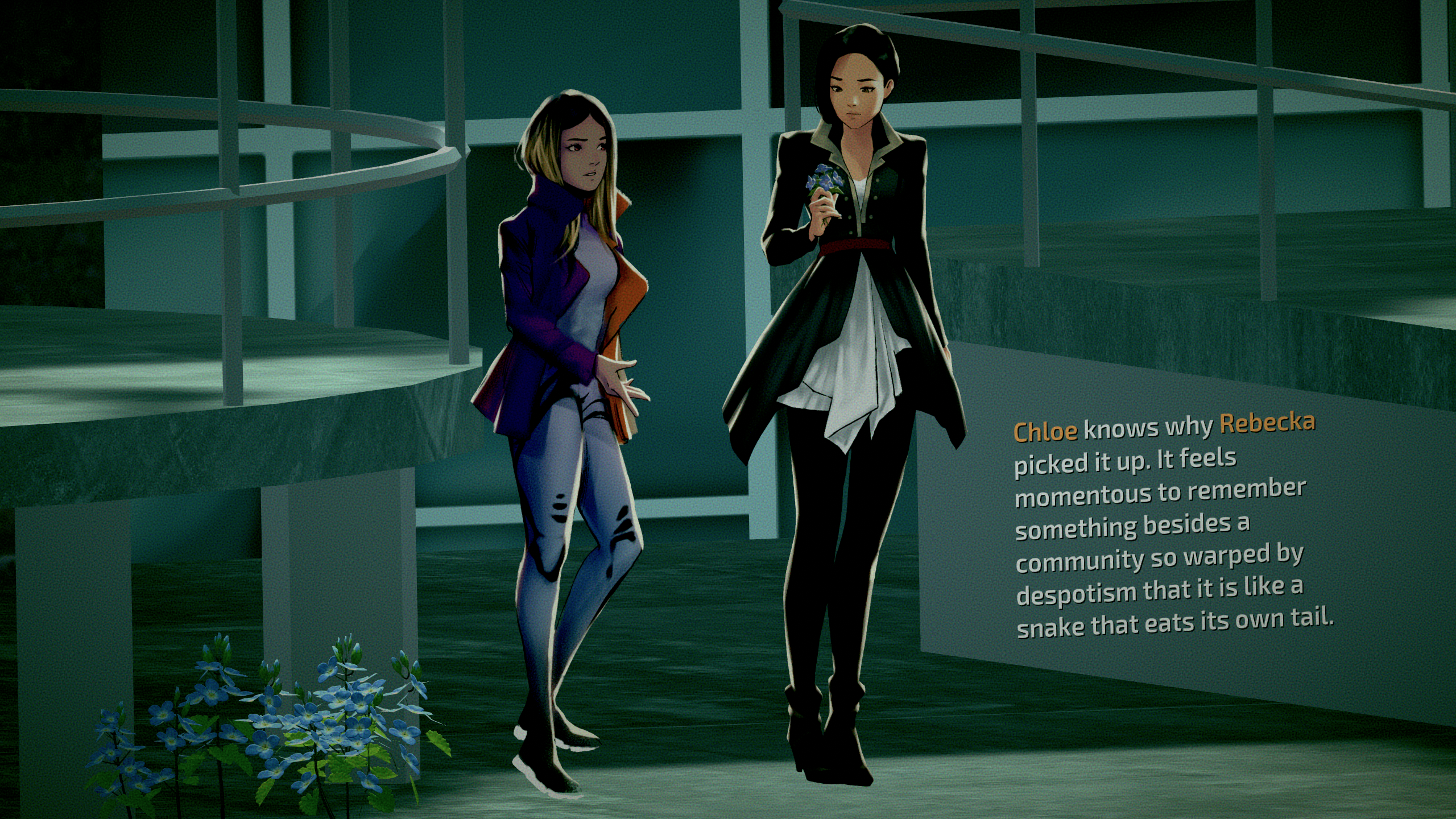
Rebecka, Chloe’s close friend and confidant who helped her escape from her authoritarian home state, counsels her to remember where she comes from and where she’s going. Rebecka and Chloe, as well as other characters in the cast like Zircon Hill grassroots activist Sueli, identify as queer and eventually form a found family of diverse individuals who don’t quite fit the mold of society. Kan wanted to explore how governance and politics are bound up in emotions and subjective ideals, drawing from texts like Sara Ahmed’s The Cultural Politics of Emotion she encountered during political science classes she previously took. Ahmed posits that as queer bodies and Others fail the ideal of compulsory heterosexuality and its reproduction of normative lives and culture, they are able to “enter different kinds of social spaces”. This allows for different modes of thinking and acting, just like Chloe and her friends, Iconohacker or no.
Like Citizen Sleeper and Paradise Killer before it, Solace State is part of a new tradition of games reorienting cyberpunk themes’ focus back to the sanguine and emotional human body and its inherent, threatened autonomy. These titles force us to consider how our bodies are not just passively acted upon in a techno-dystopia, but dynamically reacting to that world state right down to the level of our cells.





